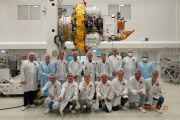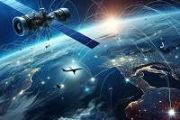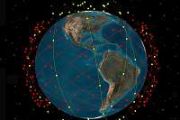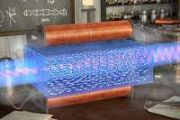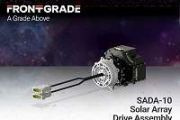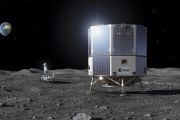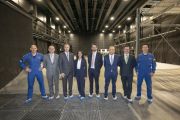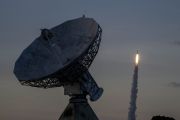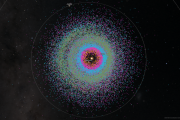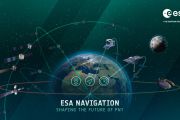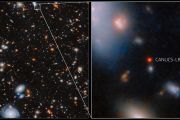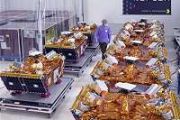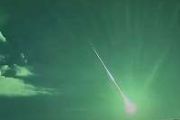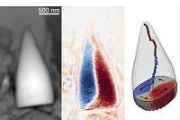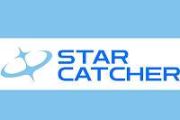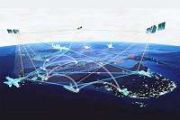
Copernical Team
Artemis IV Mission Advances with Completion of SLS Payload Adapter Testing
 The Space Launch System (SLS) has achieved a significant milestone towards the Artemis IV mission with the readiness of its payload adapter for testing, signifying a major step for the mission's success. This adapter, critical for connecting the spacecraft to the rocket, has evolved from the design used in the first three Artemis missions and is now ready for structural evaluation.
Constru
The Space Launch System (SLS) has achieved a significant milestone towards the Artemis IV mission with the readiness of its payload adapter for testing, signifying a major step for the mission's success. This adapter, critical for connecting the spacecraft to the rocket, has evolved from the design used in the first three Artemis missions and is now ready for structural evaluation.
Constru Artemis II's Orion Spacecraft to Undergo Critical Manual Handling Test
 In an upcoming landmark mission, astronauts aboard NASA's Orion spacecraft will engage in a first-of-its-kind test drive during Artemis II, assessing manual control capabilities critical for future expeditions. A major segment of this mission involves the proximity operations demonstration, where astronauts will manually maneuver Orion in space, using the SLS rocket's upper stage as a reference
In an upcoming landmark mission, astronauts aboard NASA's Orion spacecraft will engage in a first-of-its-kind test drive during Artemis II, assessing manual control capabilities critical for future expeditions. A major segment of this mission involves the proximity operations demonstration, where astronauts will manually maneuver Orion in space, using the SLS rocket's upper stage as a reference NASA Advances Blue Origin's Orbital Reef Station Life Support System Development
 As part of its initiative to establish new habitats in low Earth orbit, NASA has recently observed significant advancements in the life support system of Blue Origin's Orbital Reef, a commercial space station under development. This progress stems from the completion of testing milestones vital for sustaining human life in space, highlighting the collaboration between NASA and commercial entitie
As part of its initiative to establish new habitats in low Earth orbit, NASA has recently observed significant advancements in the life support system of Blue Origin's Orbital Reef, a commercial space station under development. This progress stems from the completion of testing milestones vital for sustaining human life in space, highlighting the collaboration between NASA and commercial entitie New strategies for astronaut helmet safety and fire suppression
 In an era where NASA is extending human presence into low Earth orbit, the lunar surface, and Mars, the NASA Engineering and Safety Center (NESC) is at the forefront of addressing the complexities involved in human spaceflight safety. The NESC, a vital part of NASA's Environmental Control and Life Support Systems (ECLSS), Crew Systems, and Extravehicular Activity (EVA) discipline, led by NASA Te
In an era where NASA is extending human presence into low Earth orbit, the lunar surface, and Mars, the NASA Engineering and Safety Center (NESC) is at the forefront of addressing the complexities involved in human spaceflight safety. The NESC, a vital part of NASA's Environmental Control and Life Support Systems (ECLSS), Crew Systems, and Extravehicular Activity (EVA) discipline, led by NASA Te Space station-bound Dragon supply capsule filled with everything from experiments to coffee
Advanced Space Revolutionizes Moon Navigation with AI-Powered CAPSTONE Experiment
 Advanced Space, LLC has successfully deploying machine learning tools for space navigation technology in cislunar space. The CAPSTONE spacecraft embarked on pioneering software tests, establishing a foundational shift towards autonomous orbital navigation.
This advancement, known as SigmaZero, employs a Neural Network (NN) to identify and address navigational challenges, such as detecting
Advanced Space, LLC has successfully deploying machine learning tools for space navigation technology in cislunar space. The CAPSTONE spacecraft embarked on pioneering software tests, establishing a foundational shift towards autonomous orbital navigation.
This advancement, known as SigmaZero, employs a Neural Network (NN) to identify and address navigational challenges, such as detecting Spaceport Nova Scotia Partners with Impulso.Space for Enhanced Launch Services from Florida
 Maritime Launch Services Inc. (Cboe CA:MAXQ, OTCQB: MAXQF) and Impulso.Space USA Corporation, in a significant expansion of their partnership, have inked a five-year agreement. Under this deal, Maritime Launch will deliver vehicle payload capacity for both rideshare and dedicated launch missions from Spaceport Nova Scotia, while Impulso.Space will offer payload integration services from its newl
Maritime Launch Services Inc. (Cboe CA:MAXQ, OTCQB: MAXQF) and Impulso.Space USA Corporation, in a significant expansion of their partnership, have inked a five-year agreement. Under this deal, Maritime Launch will deliver vehicle payload capacity for both rideshare and dedicated launch missions from Spaceport Nova Scotia, while Impulso.Space will offer payload integration services from its newl Rocket Lab Marks Milestone with Successful Launch of NRO Mission from US Soil
 Rocket Lab USA, Inc. (Nasdaq: RKLB), a major player in launch services and space systems, has successfully executed the NROL-123 mission, named 'Live and Let Fly', for the National Reconnaissance Office (NRO). This mission, launched on March 21, 2024, at 03:25 EDT using the Electron launch vehicle from Launch Complex 2 in Wallops, Virginia, signifies Rocket Lab's first launch for the NRO from U.
Rocket Lab USA, Inc. (Nasdaq: RKLB), a major player in launch services and space systems, has successfully executed the NROL-123 mission, named 'Live and Let Fly', for the National Reconnaissance Office (NRO). This mission, launched on March 21, 2024, at 03:25 EDT using the Electron launch vehicle from Launch Complex 2 in Wallops, Virginia, signifies Rocket Lab's first launch for the NRO from U. NASA and SpaceX: Enhancing Space Exploration with the 30th Resupply Mission
 The International Space Station (ISS) anticipates the arrival of critical scientific experiments and technology demonstrations from NASA's latest commercial resupply mission, undertaken by SpaceX. This mission, marking the 30th of its kind, focuses on advancing studies crucial for understanding sea ice dynamics and facilitating plant growth in the microgravity of space.
Launched from Cape
The International Space Station (ISS) anticipates the arrival of critical scientific experiments and technology demonstrations from NASA's latest commercial resupply mission, undertaken by SpaceX. This mission, marking the 30th of its kind, focuses on advancing studies crucial for understanding sea ice dynamics and facilitating plant growth in the microgravity of space.
Launched from Cape Spacecraft with first Belarussian woman cosmonaut takes off
 Marina Vasilevskaya, Belarus' first woman cosmonaut, was aboard a Russian Soyuz spacecraft that blasted off successfully on Saturday headed for the International Space Station, the Russian Roscosmos space agency said.
"The Soyuz took off from Baikonur" in Kazakhstan at 1236 GMT, Roscosmos said in a statement, adding that the spacecraft went into orbit "as planned".
Initially programm
Marina Vasilevskaya, Belarus' first woman cosmonaut, was aboard a Russian Soyuz spacecraft that blasted off successfully on Saturday headed for the International Space Station, the Russian Roscosmos space agency said.
"The Soyuz took off from Baikonur" in Kazakhstan at 1236 GMT, Roscosmos said in a statement, adding that the spacecraft went into orbit "as planned".
Initially programm 
